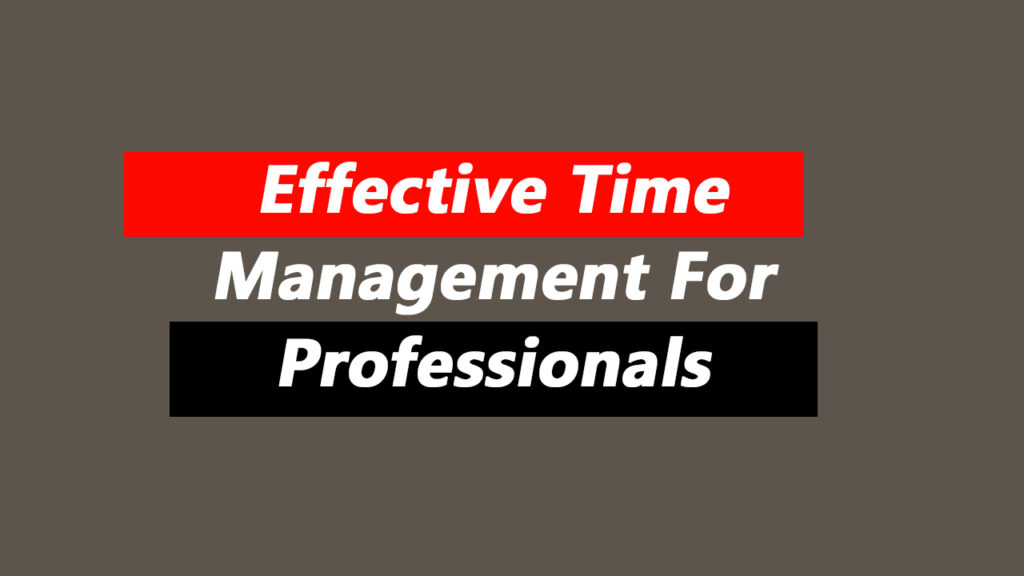
In today’s fast-paced world, time is a precious commodity, and mastering the art of time management is essential for personal and professional success. Whether you’re an entrepreneur, a freelancer, or a corporate professional, effective time management skills can help you maximize productivity, reduce stress, and achieve your goals more efficiently. In this blog post, we’ll explore the principles and practices of effective time management for professionals, empowering you to take control of your schedule and unlock your full potential.
Understanding Time Management
At its core, time management is the process of planning, organizing, and prioritizing tasks and activities to make the most efficient use of available time. It involves setting goals, identifying priorities, and allocating resources effectively to accomplish objectives within specified timeframes.
Key Principles of Effective Time Management
- Goal Setting: Begin by setting clear, specific, and achievable goals for both short-term and long-term objectives. Define what success looks like and identify the steps needed to reach your goals.
- Prioritization: Prioritize tasks based on their importance and urgency, focusing on high-priority activities that align with your goals and values. Use techniques like the Eisenhower Matrix or ABC prioritization to categorize tasks accordingly.
- Time Blocking: Allocate dedicated blocks of time for specific tasks or activities, creating structured routines and minimizing distractions. Use tools like calendars, planners, or time management apps to schedule and track your time effectively.
- Batching Similar Tasks: Group similar tasks together and tackle them in batches to minimize context switching and improve efficiency. For example, schedule dedicated time for emails, meetings, or project work to streamline workflow.
- Avoiding Multitasking: Resist the temptation to multitask, as it can decrease productivity and increase errors. Instead, focus on one task at a time, giving it your full attention and energy until completion.
- Setting Boundaries: Establish clear boundaries around your time and energy, saying no to non-essential tasks or commitments that do not align with your priorities. Learn to delegate tasks when appropriate and seek support from colleagues or collaborators.
Effective Time Management Strategies
- Time Tracking: Monitor how you spend your time using time tracking tools or techniques like the Pomodoro Technique, which involves working in focused intervals followed by short breaks. Analyze patterns and identify areas for improvement.
- Weekly Planning: Dedicate time at the beginning of each week to plan and organize your schedule, setting goals and priorities for the week ahead. Review your progress regularly and adjust your plans as needed to stay on track.
- Mindfulness and Mindset: Cultivate mindfulness and awareness of how you use your time, noticing distractions and procrastination triggers. Develop a growth mindset that embraces challenges and views setbacks as opportunities for learning and growth.
- Continuous Improvement: Reflect on your time management practices regularly, seeking feedback from peers or mentors and experimenting with new techniques or tools. Continuously iterate and refine your approach to optimize productivity and effectiveness.
Udemy’s “Effective Time Management for Professionals” Course
Udemy offers a wide range of courses dedicated to enhancing time management skills for professionals. From foundational principles to advanced techniques, these courses provide practical insights and strategies for optimizing productivity and achieving work-life balance.
Key Learning Objectives:
- Time Management Fundamentals: Understand the core principles and concepts of time management, including goal setting, prioritization, and task organization.
- Productivity Techniques: Learn proven productivity techniques and strategies for maximizing efficiency, overcoming procrastination, and minimizing distractions.
- Tools and Resources: Explore a variety of time management tools, apps, and resources to help you plan, track, and optimize your time effectively.
- Work-Life Balance: Discover strategies for achieving a healthy work-life balance, managing stress, and preventing burnout while maintaining productivity and well-being.
Conclusion
Effective time management is a skill that can transform your professional life, enabling you to achieve more with less and thrive in today’s competitive business environment. By applying the principles and practices of time management, you can take control of your schedule, enhance productivity, and unlock your full potential.
Enroll in Udemy’s “Effective Time Management for Professionals” course today and embark on a journey of self-improvement and mastery. Equip yourself with the tools, techniques, and mindset needed to manage your time effectively, achieve your goals, and create a fulfilling and balanced life both personally and professionally.






